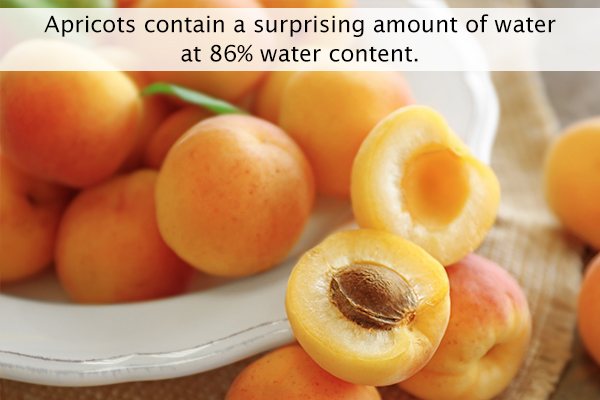In this article:
Adequate hydration is extremely important to maintain overall health all year round, but it is especially important during the warm summer months when you tend to lose a lot more water due to sweating.

Inadequate water intake can lead to dehydration, which can cause fatigue, headaches, low blood pressure, and a rapid heart rate. While experts generally recommend 8 glasses of water per day, achieving this through water intake alone is often difficult for many individuals.
Not only can you get a significant amount of water from fruits, but they are also high in fiber, which can help with satiety and weight loss.
This article will discuss the top 10 fruits with the highest water content to help keep you hydrated not only during the summer but throughout the year.
1. Cucumber

You might be surprised to see cucumber in a list of top 10 fruits for hydration as they are commonly recognized as a vegetable. However, from a botanical definition, cucumbers are considered a fruit due to their seeds.
With 95% water content, cucumbers contribute a significant amount of water to your daily intake. (1)
While cucumbers are mostly water, they contain a small amount of vitamin K, potassium, and magnesium. These nutrients help to support heart health and protect against magnesium deficiency, which can cause cramps and headaches.
2. Tomatoes
Tomatoes, like cucumber, are considered a fruit due to their seed content. At 94% water content, they provide about ½ cup of water per 1 medium tomato.
Tomatoes are rich in immune-boosting vitamins A and C and contain the antioxidant lycopene, which has been shown to help reduce the risk of heart disease. (2)
3. Watermelon
With a water content of 92%, watermelon is one of the most hydrating fruits that you can eat. (3) Because of its high water content, it is also low in caloric density, which makes it a great addition to your weight loss efforts.
Additionally, watermelon contains many important nutrients, including vitamin C, vitamin A, and magnesium. It is also rich in lycopene, which helps to reduce oxidative damage to cells and thus protect against heart disease and diabetes. (3)
A summer favorite, watermelon, is sure to help keep you feeling hydrated while providing many additional health benefits.
4. Strawberries

With a water content of 91%, strawberries are a very hydrating fruit. They contain a good amount of fiber in addition to vitamin C, folate, and manganese. (4) They have also been shown to help reduce inflammation in the body, which is protective against heart disease and various types of cancer. (4)
Strawberries can easily be incorporated into smoothies or summer salads, which will surely help keep you cool on warm summer days.
5. Cantaloupe
Cantaloupe is a kind of melon that may support your health in many ways. One cup (177 grams) of cantaloupe contains about 90% water and delivers more than half a cup of water per serving.
Additionally, cantaloupe contains 2 grams of fiber per serving, which can help you stay full and promote weight loss. It is also rich in vitamin A, providing 120% of daily needs in a 1 cup serving. Vitamin A has been shown to protect against infection. (5)
6. Peaches

Like many of the fruits listed, peaches are nutrient-dense and hydrating, 100 gm of peaches contains 89% of water. Peaches contain vitamin A, vitamin C, B vitamins, and potassium.
Peach skin also provides the antioxidant chlorogenic acid, which helps to slow the release of glucose into the bloodstream after a meal. It also has been shown to have a small effect on decreasing blood pressure. (6)(7)
7. Grapefruit
Grapefruit is a citrus fruit that contributes a decent amount of water to your daily hydration needs with its 88% water content. Half a cup of grapefruit offers about ½ cup of water.
Grapefruit is rich in fiber, antioxidants, and several vitamins and minerals, including vitamin A, vitamin C, potassium, and folate. (8) With an exceptionally high vitamin C content (120% of daily needs in ½ cup), grapefruit is an excellent immune-boosting fruit.
Many studies have shown grapefruit to aid in weight loss, lower blood pressure, reduce cholesterol levels, and reduce blood sugar levels. (9)
8. Oranges
With 88% water content, oranges provide a significant amount of water per serving to help keep you hydrated. Additionally, they are high in potassium and vitamin C, which are helpful for heart health and immune function.
A compound found in oranges called flavonoids can help to prevent cell damage by reducing inflammation. (10) Additionally, citrus fruits like oranges may help to protect against kidney stones because of their citric acid content. Citric acid binds with calcium oxalate and helps to flush it out of the body.
Adequate hydration also helps to prevent kidney stone formation, and with their high water content, oranges are a great choice.
ALSO READ: All You Need to Know About Oranges: Health Benefits, Drug Interactions, and Allergies
9. Pineapples
At 87% water content, pineapples are not only delicious but very hydrating as well. Pineapples are rich in vitamin C, which can help to boost your immune system by reducing cell damage. (11)
Additionally, pineapples contain two different types of fiber, soluble and insoluble, which can help with many digestive issues and aid in weight management. (12) This fruit is also high in manganese, which supports bone health.
10. Apricots

Apricots contain a surprising amount of water at 86% water content. Apricots can keep you hydrated as they contain about 2/3 cup of water per 1 cup serving. With their high water content, they can help regulate blood pressure, body temperature, and heart rate.
Apricots may also help to improve digestion because of their high fiber content. Additionally, apricots contain many antioxidants that protect the body against free radicals. (13)
Final Word
While maintaining adequate hydration is important year-round, it is especially important during the summer months when dehydration is more likely to occur. Many individuals may have trouble drinking an adequate amount of fluid to stay fully hydrated. Therefore, consuming a diet rich in these various fruits can help maintain hydration.
These fruits also provide immune benefits, protection from chronic diseases, and high amounts of fiber, which is beneficial for weight management and digestive health.
- Was this article helpful?
- YES, THANKS!NOT REALLY


